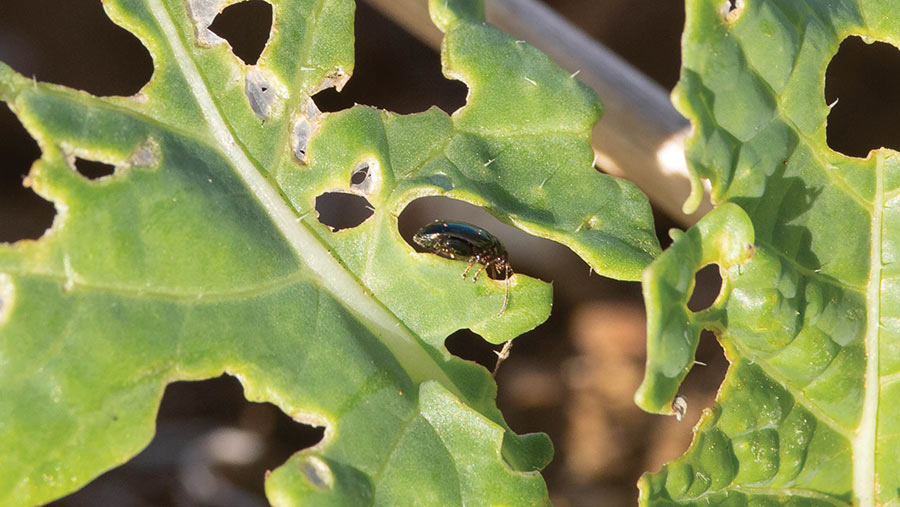Hot weather sees increased flea beetle activity in OSR
 © Tim Scrivener
© Tim Scrivener The late summer heatwave has created ideal conditions for flea beetle, leaving fields of emerging oilseed rape vulnerable to damage by the pest.
Since the weekend and the return of the hot weather, populations of cabbage stem flea beetle (CSFB) have increased and growers in some counties have already suffered damage to emerging OSR crops.
But agronomists have urged farmers to avoid spraying crops with pyrethroids and only use these as a last resort, as flea beetle resistance to this class of chemistry is widespread.
See also: How OSR variety choice helps crops survive flea beetle
There is a three-way split among OSR growers concerning drilling dates. Some drilled their crops early, in July, and battled slug infestations.
These well-established crops have a higher chance of withstanding adult flea beetle feeding damage.
However, crops sown in the past two weeks are most at risk of damage as flea beetle feed on cotyledons and first true leaves, potentially killing plants.
Meanwhile, in the warmer southern counties of England in particular, some farmers are holding off drilling OSR until early to mid-September, but they still face the risk of protracted flea beetle presence.
East Yorkshire farmer Paul Temple drilled 38ha of OSR at Wold Farm, near Driffield, earlier this week.
He said he is “living in hope” that the weather will turn cooler after the weekend and reduce the threat of flea beetle damage to his crop.
Reports of redrilling
“I’m hoping it turns cooler, but for many people who have already drilled OSR crops, the flea beetle is making a real mess of them,” said Mr Temple.
“There are some reports of redrilling crops already, which is very disappointing.”
He said he will not spray his crops with pyrethroids, but may use the liquid-carbon based fertiliser L-CBF Boost to enhance early stage growth.
Colin Peters, a break crops specialist at Niab, said: “This year, we are again seeing a reduction in adult numbers emerging where we have used IPM cultivations practices after harvesting rape.
“Unfortunately, our emergence traps are showing a large number of flea beetle adults emerging from the soil in the past two weeks.
“Crops that are at a vulnerable stage are facing a perfect storm of high temperatures and high numbers of adult flea beetle.”

